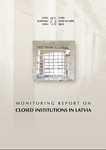Monitoring Report on Closed Institutions in Latvia
Latvia has over 100 places of detention: 9 mental hospitals, 31 social care home, 15 prisons, 28 State police short-term detention cells, detention rooms at border posts, an illegal migrant detention facility at Olaine, and other facilities holding persons deprived of liberty by state authority. During the project „Monitoring Human Rights and Prevention of Torture in Closed Institutions: Prisons, Police Cells and Mental Health Care Institutions in Baltic Countries” 102 monitoring visits were conducted, including 15 visits to mental hospitals, 23 visits to social care homes for mentally disabled, 21 visit to state and municipal police custody facilities, 22 visits to prisons, 21 visit to illegal migrant detention facilities (and reception centre for asylum seekers and refugees).
Concerning mental health care in Latvia community based services are almost unavailable. Thus, in most cases users of psychiatric services are compelled to receive regular treatment at psychiatric hospitals or to move to a social care home for the rest of their lives. The main identified problems in psychiatric hospitals are the following: the legislation has not been harmonized with international human rights standards in the field of involuntary hospitalization as there is no appeal mechanism established for cases of involuntary hospitalization and treatment, and Latvia continues to violate the requirements of Article 5 of the European Convention for Protection of Human Rights and Fundamental Freedoms.
Key problems concerning the rights of illegal migrants and asylum seekers are more related to the lack of provision of information on their rights, shortcomings in legislation as well as unclear possibilities in exercising one’s rights in practice as provided by the law rather than conditions of detention.
Conditions in the visited police stations range from terrible to good. There is no in-cell sanitation in a considerable number of police custody facilities and detainees are obligated to use buckets for their need of nature, often in the presence of other detainees. In many police stations detainees are obligated to sleep on a wooden platform with other detainees.
Regarding the prisoners, a serious absence of employment in several visited prisons is established (only 70 out of 651 prisoners in Jekabpils Prison and 55 out of 602 prisoners in Parlielupe Prison are employed).
Although fundamental legislation affecting prisoners has been adopted in 2005 – 2006 (Criminal Procedure Law, Law on Holding in Pre-Trial Detention, etc.), many prisoners remain uninformed and cannot adequately exercise their rights provided by the above legislation.
Riga, 2006
Author: Latvian Centre for Human Rights
Funding: European Commission
Attachments
Published: 2006-09-24
